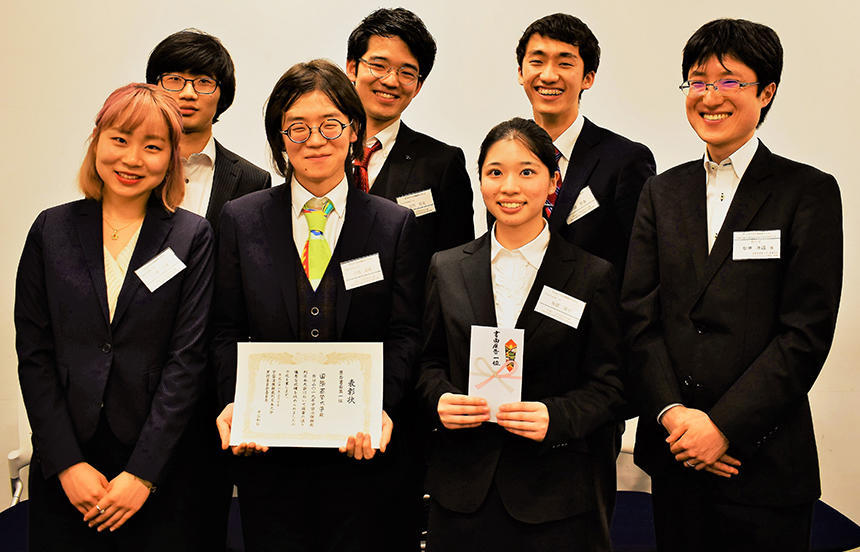NEWS
ICU Students Place 1st in Plaintiff's Memorial, and Other Prizes in the 14th Space Law Moot Court Competition
Update: March 20, 2019

Students who participated in the competition and accompanying instructor From left: Saki Mishima (1st year student), Kei Tanaka (2nd year), Mitsuki Toda (3rd year), Yuto Egawa (3rd year), Sayako Goto (2nd year), Chihiro Yamasaki (1st year), Assistant Professor Hiromichi Matsuda
An ICU team, comprising of Mitsuki Toda (3rd year student), Yuto Egawa (3rd year), Sayako Goto (2nd year), Kei Tanaka (2nd year), Saki Mishima (1st year), and Chihiro Yamasaki (1st year), participated in the 14th Space Law Moot Court Competition* held on March 10 (Sun.), winning 1st place in the plaintiff's memorial, 2nd in defendant's memorial and 3rd place overall. Besides ICU, the competition saw the participation of a total of 35 students from Kyoto University, University of Tokyo, Toyo University, Waseda University, Sophia University and the Space Development Forum.
At the Space Law Moot Court Competition, the students competed in the legal technique of presenting oral arguments and answering questions regarding complex disputes around the space development, which could actually occur, in front of university professors, JAXA employees and lawyers, who play the role of the judges of the International Court of Justice. The students prepared detailed legal briefs from both the plaintiff's and defendant's side through painstaking research of documents and practiced the pleading repeatedly before going into the competition.
Comment from Mr. Toda, who represented the team:
First of all, I would like to profoundly thank Ms. Sayako Goto, Mr. Chihiro Yamasaki, Mr. Yuto Egawa, Ms. Saki Mishima and Mr. Kei Tanaka who took part in the Space Law Moot Court Competition with me as well as Assistant Professor Hiromichi Matsuda, who guided us. I would also like to mention here that we received considerable support from physics major Professor Hideki Okamura and others in preparing the plaintiff's memorial in which we placed first. Finally, I would also like to express my gratitude to everyone at the Space Law Japan Students Conference who gave us the valuable opportunity to take part in this moot court.
I would recommend those who are thinking of participating in international moot court competitions in the future to study law subjects. Nonetheless, what is required of ICU students is not just attending these classes and acquiring basic knowledge but systematizing that knowledge as a map for education and to continuing providing philosophical concepts to that learning. An international moot court competition could be termed as a perfect opportunity to practice such intellectual exercises. I hope that, through the participation in such contests, as many students as possible in the future will be able to develop their learning in ways that are typical at ICU.
Comments by Assistant Professor Matsuda, who guided the students:
International moot court competition calls for a comprehensive intellectual ability that cannot be measured merely based on volume of knowledge--such as carefully building a legal argument with respect to an unknown problem and by promptly responding to the tough questions from experts persuasively arguing one's case. ICU students learn critical thinking right from the first year, extensively read academic articles in many languages on their own and go on to master high level capability to construct persuasive arguments in both English and Japanese languages. I hope ICU students will contribute towards the peaceful settlement of the various international disputes occurring globally by leveraging the deep, broad and flexible ability gained through their liberal arts education.
